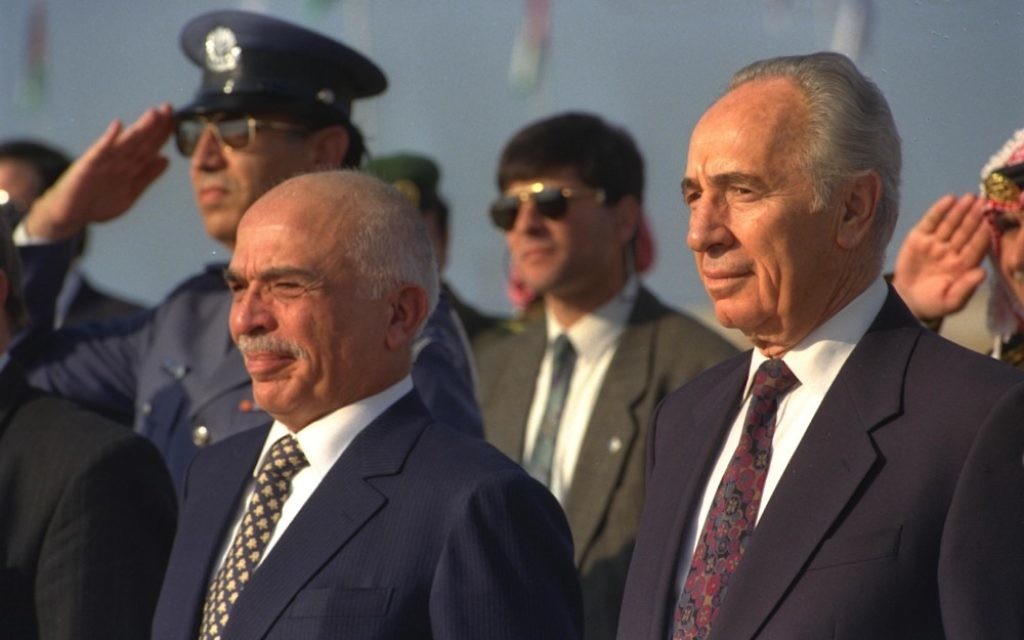Shimon Peres and a Trip to Egypt
Shimon Peres, the former president and prime minister of Israel, died early Wednesday at age 93. Here’s one remembrance from a Jewish Atlantan.
Late one night in September 1986, in a hotel suite in Alexandria, Egypt, Israeli Prime Minister Shimon Peres sat in a wingback chair and spoke to Israeli and foreign journalists, all the while picking apart, small piece by small piece, an empty hard pack of Kent cigarettes.
It had been a long and historic day.
Get The AJT Newsletter by email and never miss our top stories Free Sign Up
Israel’s white-and-blue flag had flown at the Ras-el-tin palace, and an Egyptian army band had played “Hatikvah,” Israel’s nation anthem — “a tentative rendition,” one journalist wrote — as Peres arrived to meet with Egyptian President Hosni Mubarak.
A charter flight of journalists who had flown from Israel was stuck on the stifling plane for two hours after arriving in Alexandria because the Egyptians did not have a staircase available. Offers to jump from the back of the plane were rejected by Egyptian authorities.
My vantage point for the Peres briefing was to lean against a wall behind and to the left of his chair. He spoke in Hebrew but repeated most of his comments in English for the benefit of the Western press.
The headlines from the meeting were an Egyptian pledge to return its ambassador to Tel Aviv and efforts to resolve the Taba border dispute. A joint communique said the Israelis and Egyptians had declared 1987 “a year of negotiations for peace,” but without setting a plan for further discussions.
Peres was constrained in his actions by the knowledge that in a month he would exchange jobs with Foreign Minister Yitzhak Shamir of the Likud party in a rotation agreement after the 1984 elections left the parties at roughly equal strength.
Despite the late hour, the 63-year-old Peres wore a suit, and his tie remained knotted.
Also along on the trip, but not in the room, was Peres’ sartorial opposite, Cabinet minister Ezer Weizman, who wore his shirt unbuttoned, spoke loudly and charmed Alexandrians during a nocturnal walk by greeting and chatting with them in Arabic.
I remember a photograph of an early Israeli government. Prime Minister David Ben-Gurion was seated front row, center, with his shock of untamed white hair and his shirt collar opened wide. Every other man in the photograph was dressed similarly, with his jacket unbuttoned and collar open — save for one, wearing a suit, a white shirt and a tie.
Shimon Peres, a picture of formality in a country that prized informality, a diplomat in a country that prized warriors.
Peres the European, the Polish immigrant, the Labor Party member of the Socialist international, with an affinity for the French, the politician and diplomat whose services to his nation were immense (and some revealed only many years later), yet who, until his later years, never seemed to enjoy the degree of public affection accorded his more rough-hewn colleagues.
He was a gracious interview, a full-throated patriot who spoke in calm, measured tones without the bombast of others, a diplomat who defended his country to the fullest even while advocating for closer ties with nations others considered to be the enemy.
“There is an oily land and a holy land,” he told English-speaking audiences in his Polish accent. We may not have the oil, but Israel has other virtues, he would say.
Dave Schechter, who writes a column and long-form articles for the Atlanta Jewish Times, was a network television producer based in Israel in the mid-1980s.





comments